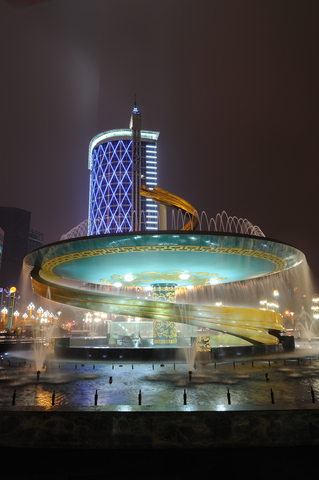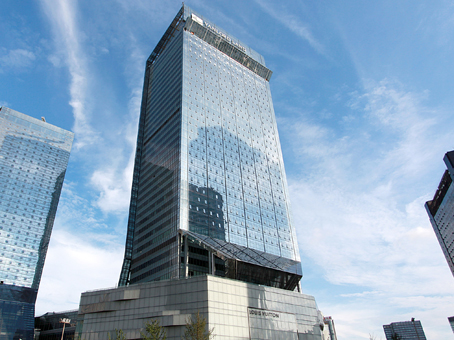
[Updated Oct 2020] A guide to serviced offices and office space for rent in Chengdu as well as general information that may be useful if you are considering renting office space in the city.
For further Chengdu offices information or to search office space for rent in Chengdu just click. Or contact us for any office space query.
History & Geography
One of the largest cities in western China, Chengdu is a powerful cultural, economic and industrial powerhouse. The city is located on a vast plain in central China and is bordered by Xiling Snow Mountain in the west and Longmen Mountain to the north. To the east lies the Sichuan Basin and Longquan Mountain. Chengdu has been a major city for almost 2000 years and was established by Kaiming IX. During the early 4th century Chengdu was made the capital. The city became the first place that paper money was widely used in CE 960. Over the centuries the city continued to expand in power and influence. In 1279 Chengdu was sacked by the Mongols and 1.4 million residents of the city were killed. The city once again suffered in 1644 when rebel leader Zhang Xianzhong set up his headquarters in the city and reputedly massacred many of the inhabitants. Chengdu was vastly depopulated and for a time became a virtual ghost town. During WWII the city was an important base for the Kuomintang and many important cultural institutions and industry came to the city. The city was also a major base for the US Air Force during the war. After WII during the Chinese Civil War Chengdu remained a major base for General Chiang Kaishek and the Kuomintang. However, the city fell to the People’s Liberation Army and the Kuomintang fled to Taiwan. Since then Chengdu has continued to expand and develop. Light industry and manufacturing have continued to be a significant part of the city’s success. In 2008 Chengdu was struck by a major earthquake which caused massive damage to the city and resulted in 80,000 people dead. Most of the city’s major buildings remained intact however and the damage was rebuilt. Today Chengdu is thriving both economically and culturally.
Economy
Chengdu has a healthy, diversified economy, consisting of agriculture, manufacturing, IT, logistics, commerce, and financial services. Chengdu is popular with foreign investors and many non-Chinese companies have a large presence in the city. Among these are Nippon Steel Corporation, ANZ Bank, Electricite de France, JP Morgan, and others. Primary among Chengdu’s industry is IT and electronics. The city is China’s IT and electronics hub and the Chengdu Hi-Tech Industrial Development Zone has attracted a host of tech companies, including SAP, Siemens, HP, Canon, Xerox, Cisco, IBM, Intel, NIIT and Wipro. The financial services industry is also a major driver of the city’s economy and employs a significant segment of the city’s workforce. Among the companies in this sector are BNP Paribas, HSBC, Citigroup and Standard Chartered Bank. Many Chinese domestic financial services companies are also based in Chengdu, including West China Securities, GuoJin Securities, and Chengdu Commercial Bank. Outsourcing, logistics and trade make up the other significant industries in Chengdu’s economy. The automobile industry and defence industry have of late been growing in importance as well. Chengdu has also had a highly developed agricultural industry for many years and this continues to thrive due to the regions favourable weather conditions and natural resources. Furthermore, Chengdu has recently become known as a popular convention and exhibition centre.
Tourism & Culture
Chengdu is known as one of the most culturally significant cities in China. It has been home to a number of well-known Chinese authors such as Sima Xiangru and Yang Xiong. A fair number of poets have also emerged from Chengdu, the most prominent of which are undoubtedly Zhao Chongzuo and Meng Chang. The city is also a recognized centre of Sichuan Opera and comedic opera named Zaju. Chengdu and the province of Sichuan are also famous for their cuisine. Food from Sichuan tends to be spicy and flavourful. Favourite dishes are Chengdu hot pot and Dan Dan noodles. Tea is also an important part of the culture of Chengdu and the city has hundreds of distinctive tea houses, recognizable by their bamboo stools and wooden tables. Chengdu has a strong tourism industry and many visitors come to see the famous giant pandas which reside in the city. Among the most endangered species in the world, the panda bear lives in the wild in Sichuan province. There is also a large panda breeding centre in the city itself which attracts hundreds of thousands of visitors year round.
Transportation
The city is served by the Chengdu Shuangliu International Airport, located approximately 16 kilometres south of downtown Chengdu. The airport is the fourth busiest in China and serves almost 40 million passengers per year. Chengdu is also an important railway hub and has two main passenger stations, Chengdu East Railway Station and Chengdu Railway Station. The city also boasts an inter-city high-speed train which first became operational in 2010. There is a large bus network serving Chengdu, as well as several long-distance services to nearby towns and cities.

Office space to rent in Chengdu
Chengdu’s economy is thriving, with a real estate investment growth rate of approximately 22 percent annually. In 2012 the absorption of Grade A office space was at 184,000 square metres. A number of new projects such as the China Overseas International Centre and the Minyoun Financial Plaza could lead to vacancy rates climbing, however, with demand also increasing, it is unlikely the climb will be dramatic. Vacancy is hovering around 24 percent and the average rental rate is RMB 160 per square metre per month. The city’s economy is widely predicted to continue expanding and foreign investment is also likely to climb.
Our office space search, advisory and acquisition services are FREE, always. Our Chengdu office space brokers and agents are globally regulated by the Royal Institution of Chartered Surveyors (RICS) ensuring the highest standards of commercial property advice and service at all times.
